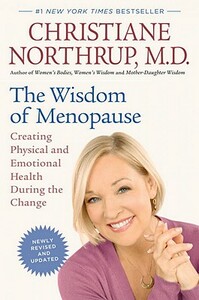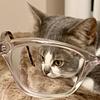Take a photo of a barcode or cover
6 reviews for:
The Wisdom of Menopause: Creating Physical and Emotional Health During the Change
Christiane Northrup
6 reviews for:
The Wisdom of Menopause: Creating Physical and Emotional Health During the Change
Christiane Northrup
This is such a wonderful reference book. I'd forgotten I'd read it! She is so enlightened and tender in her writing.
I’m almost embarrassed to say I read this book years ago, given the crackpot and quack that Christiane Northrop has become.
Why did I buy this in my early 30s I have no idea. Still not
She’s gone complete quack.
https://en.wikipedia.org/wiki/Christiane_Northrup
She’s gone complete quack.
https://en.wikipedia.org/wiki/Christiane_Northrup
Once again, I have profoundly mixed feelings about a health-related book. Is it the books, or is it me? Anyway, take the rating of a three as more like an average of reactions all over the map.
This book was initially recommended to me by a friend who suggested using it as a reference: Look up your menopausal symptom of choice, and she'll recommend supplements, dietary changes, and medical treatments pertinent to that issue. It may well be that it would work better in that mode. I instead decided that I was interested in not just the symptoms I have now, but the whole picture, including things I may experience in future, so I set out to read the whole thing. It turned out there were certain sections that I did skim or skip altogether, but I did end up reading a fair percentage of it.
On the positive side: If you want to learn about a variety of approaches, ranging from the "natural" to the pharmaceutical, this book is a good resource. She does provide references to the research, which makes her statements more compelling to me, and I think would be helpful if you needed to discuss options with your physician. If you are interested in trying (for instance) dietary changes first, before moving on to prescription drugs, she provides specific advice tied to particular conditions / symptoms.
In particular, I think the sections that discuss different kinds of hormone treatments are extremely informative. Prior to reading this, if my doctor had recommended hormones, I would have had no idea that I even ought to ask the question "exactly what kind?" If hormone therapy is something you are considering, reading (the relevant sections of) this book will be a great investment.
I also appreciate that her recommendations for supplements are very detailed and specific -- although the sheer quantity of supplements and other dietary recommendations was a bit overwhelming for me. For me personally, it's hard to know where to start, or what to prioritize.
Now to the negative: Although I do accept that attitude and emotion, and certainly stress level, are interdependent with physical health, there can be a fine line between saying "it's important to take care of all aspects of yourself" and saying "if you get sick, it's your fault because you're not dealing with your shit". I'm afraid in my reading, Dr Northrup is way over that line. In particular, having several friends who have had breast cancer, it infuriates me to read statements that imply that it was caused by repressed emotion or lack of self-care.
I will admit that, although I want to be open-minded, in a medical context it is easier for me to accept statements that sound like science rather than mysticism. I experienced rather profound mental whiplash when (for instance) reading a detailed description of the physiology of iodine processing, then turn the page and read "the most important thing to remember about iodine is that it is linked with the fifth chakra" (paraphrasing, because I'm too lazy to find the page, but I know the phrase "the most important" was in there).
So, overall: If you are sensitive to suggestions of victim-blaming, particularly regarding breast cancer, you may need to avoid this book. If you are looking for details on hormone therapy options and alternatives, it's a great resource. For other menopausal concerns, it's potentially a good resource, if you can add enough salt for your own taste.
This book was initially recommended to me by a friend who suggested using it as a reference: Look up your menopausal symptom of choice, and she'll recommend supplements, dietary changes, and medical treatments pertinent to that issue. It may well be that it would work better in that mode. I instead decided that I was interested in not just the symptoms I have now, but the whole picture, including things I may experience in future, so I set out to read the whole thing. It turned out there were certain sections that I did skim or skip altogether, but I did end up reading a fair percentage of it.
On the positive side: If you want to learn about a variety of approaches, ranging from the "natural" to the pharmaceutical, this book is a good resource. She does provide references to the research, which makes her statements more compelling to me, and I think would be helpful if you needed to discuss options with your physician. If you are interested in trying (for instance) dietary changes first, before moving on to prescription drugs, she provides specific advice tied to particular conditions / symptoms.
In particular, I think the sections that discuss different kinds of hormone treatments are extremely informative. Prior to reading this, if my doctor had recommended hormones, I would have had no idea that I even ought to ask the question "exactly what kind?" If hormone therapy is something you are considering, reading (the relevant sections of) this book will be a great investment.
I also appreciate that her recommendations for supplements are very detailed and specific -- although the sheer quantity of supplements and other dietary recommendations was a bit overwhelming for me. For me personally, it's hard to know where to start, or what to prioritize.
Now to the negative: Although I do accept that attitude and emotion, and certainly stress level, are interdependent with physical health, there can be a fine line between saying "it's important to take care of all aspects of yourself" and saying "if you get sick, it's your fault because you're not dealing with your shit". I'm afraid in my reading, Dr Northrup is way over that line. In particular, having several friends who have had breast cancer, it infuriates me to read statements that imply that it was caused by repressed emotion or lack of self-care.
I will admit that, although I want to be open-minded, in a medical context it is easier for me to accept statements that sound like science rather than mysticism. I experienced rather profound mental whiplash when (for instance) reading a detailed description of the physiology of iodine processing, then turn the page and read "the most important thing to remember about iodine is that it is linked with the fifth chakra" (paraphrasing, because I'm too lazy to find the page, but I know the phrase "the most important" was in there).
So, overall: If you are sensitive to suggestions of victim-blaming, particularly regarding breast cancer, you may need to avoid this book. If you are looking for details on hormone therapy options and alternatives, it's a great resource. For other menopausal concerns, it's potentially a good resource, if you can add enough salt for your own taste.
I read the first, oh, hundred pages and then I started skimming for things to snort at. There were lots of things for my skeptical atheist self to snort at. Including gems like:
"The difference between the postpartum period and perimenopause is that during perimenopause you're giving birth to yourself."
"It has now been scientifically documented that specific patterns of emotional vulnerability affect specific organs or systems of the body." (No footnotes or citations here.)
"One of the first things you need to do in order to heal your digestive problems at midlife is to shore up your third emotional center.
The third emotional center is located in the solar plexus area, and the health of this area affects all our organs of digestion, including the stomach, liver, gallbladder, pancreas, small intestine and upper large intestine. Women with substantial weight problems usually have unresolved issues in the third emotional center."
And so forth. Lots of talk about one's soul.
To be scrupulously fair, there's plenty of good information in this book. I'm just not willing to wade through all the bullshit to get to it.
"The difference between the postpartum period and perimenopause is that during perimenopause you're giving birth to yourself."
"It has now been scientifically documented that specific patterns of emotional vulnerability affect specific organs or systems of the body." (No footnotes or citations here.)
"One of the first things you need to do in order to heal your digestive problems at midlife is to shore up your third emotional center.
The third emotional center is located in the solar plexus area, and the health of this area affects all our organs of digestion, including the stomach, liver, gallbladder, pancreas, small intestine and upper large intestine. Women with substantial weight problems usually have unresolved issues in the third emotional center."
And so forth. Lots of talk about one's soul.
To be scrupulously fair, there's plenty of good information in this book. I'm just not willing to wade through all the bullshit to get to it.
Northrup is a bit flaky sometimes, but she has some really good suggestions. Fun times.




